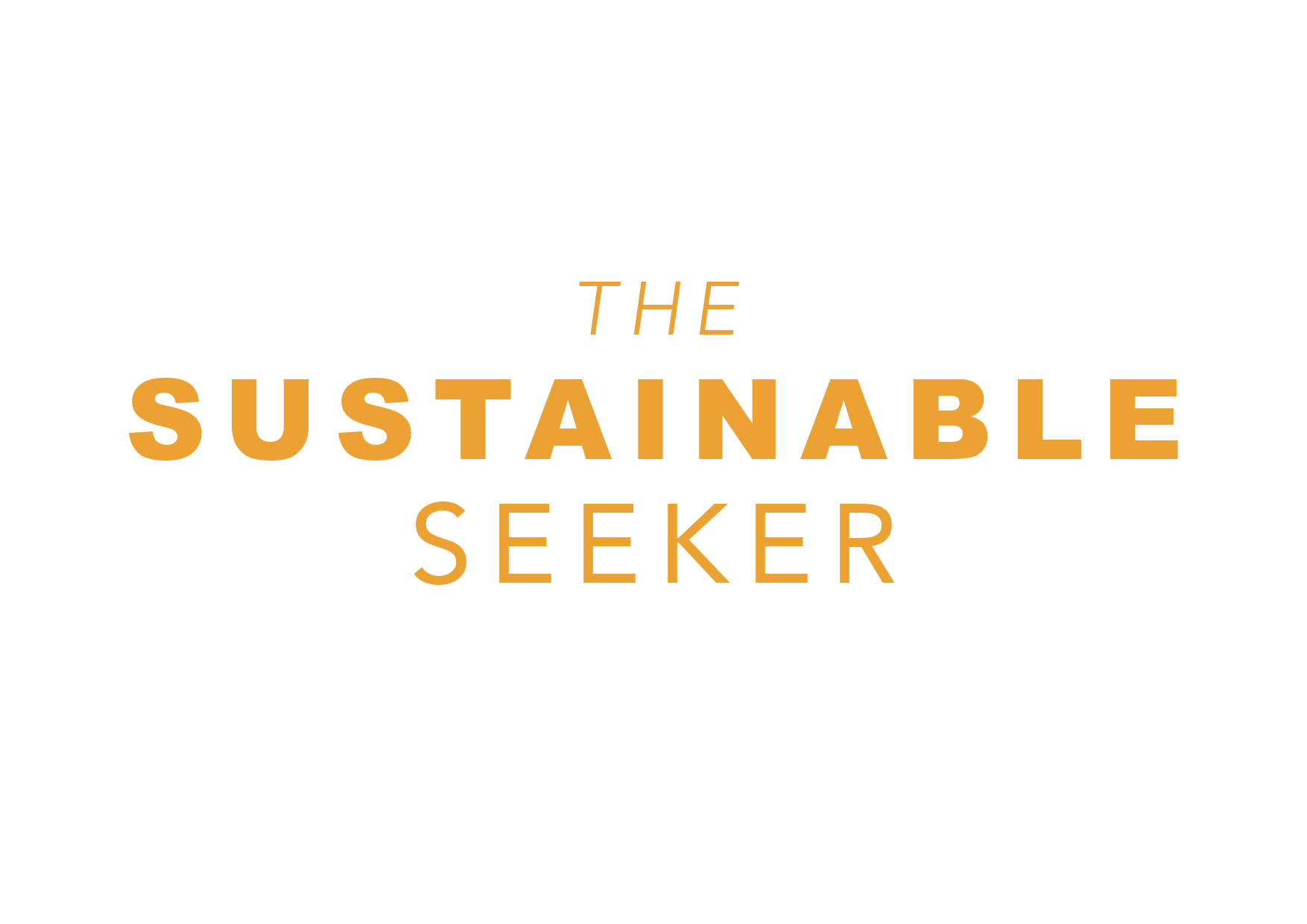Finding the best eco-friendly coffee brands does not have to be a chore, this article is here to help you!
I’m assuming you’re a caffeine enthusiast and also someone who likes to incorporate more green practices in your life.
That’s why you’re here! And I’m here to tell you that I’ve got it covered, finding you the best eco-friendly coffee brands and blends of flavourful coffee beans.
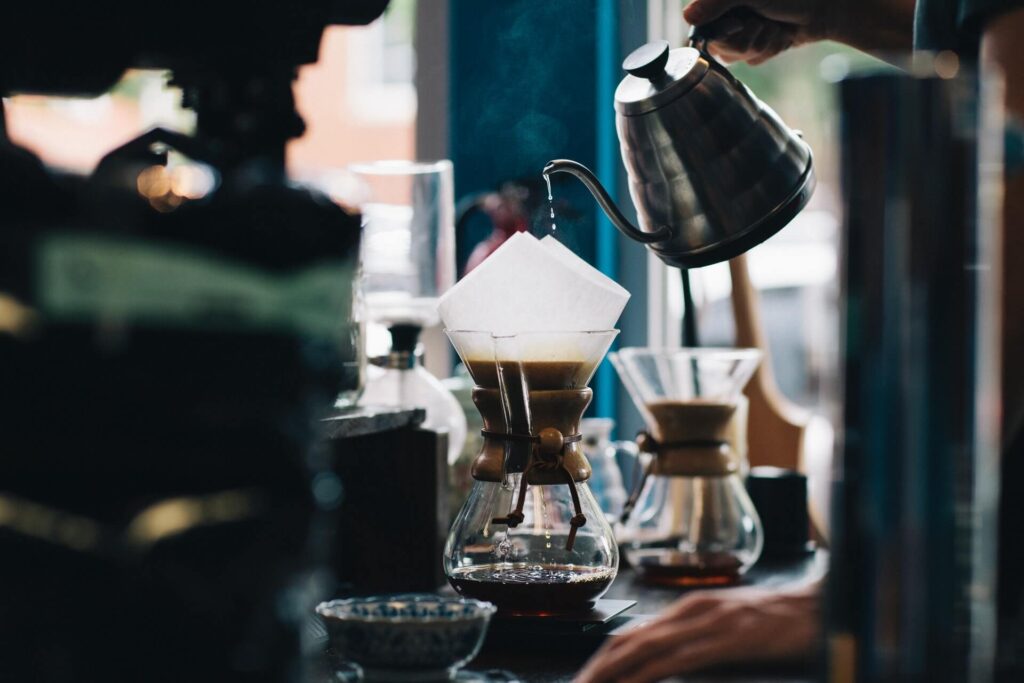
Coffee farming and trade have a significant contribution to environmental and social challenges, especially when compared to most other economic activities.
Having the first sip of coffee is one of the best parts the day and now there are ways to make drinking coffee sustainably.
Here are the 12 best eco friendly coffee brands for you to try!
Affiliate Link Disclosure
This article contains some affiliate links which means that I may earn a small commission when you click on them, at no additional cost to you. I do hope you find the information in this article helpful!
Related posts
- 12 BEST ECO FRIENDLY BABY GIFTS
- BAMBOO TOILET PAPER : EVERYTHING YOU WISHED YOU KNEW
- BENEFITS OF SUSTAINABLE TOURISM: ALL YOU NEED TO KNOW TO BE A SUSTAINABLE TRAVELER
- ETHICAL GIFT IDEAS THAT LOOK AFTER MOTHER EARTH
- ZERO WASTE GIFTS YOU CAN BUY FOR YOUR LOVED ONES
- ZERO WASTE FOOD STORAGE – A COMPREHENSIVE GUIDE
Summary of the best eco-friendly coffee brands:
- Ethical Bean Coffee
- Nguyen Coffee Supply
- Peace Coffee
- Larry’s Coffee
- Tiny Footprint Coffee
- Wandering Bear Coffee
12 Best Eco Friendly Coffee Brands
1. Ethical Bean Coffee
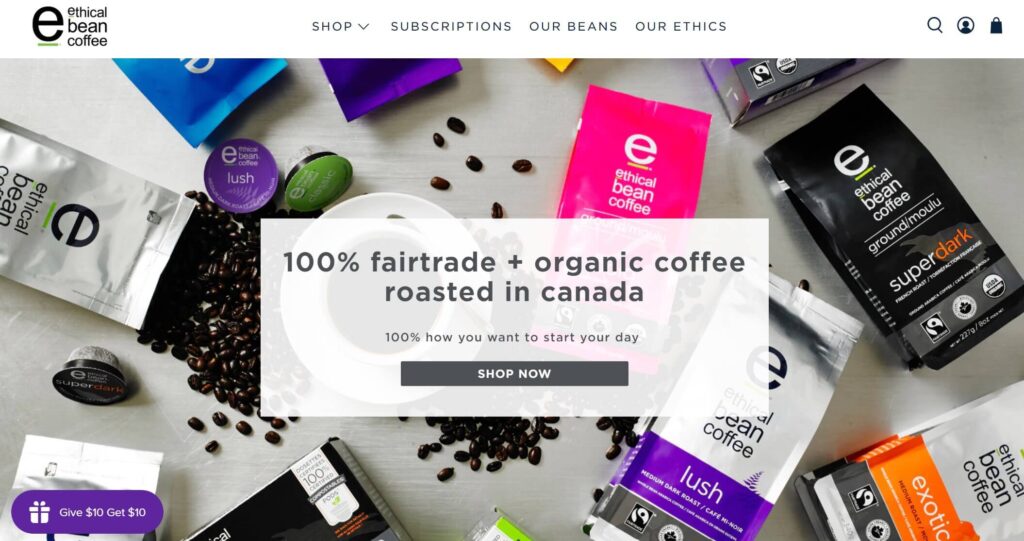
Aaron De Lazzer, Director of Ethical Bean Coffee earned Canada’s first Certified Q Grader in 2008.
The coffee beans are chosen by hand and Aaron works closely with the production staff to ensure that they are roasted to perfection.
He sources the beans seasonally based on the harvest calendar to ensure you get the freshest coffee available. This means the origin of the coffee offered by Ethical Bean will differ depending on the time of year.
The coffee is fairtrade certified, roasted, and organic in a LEED-certified facility utilizing an energy-efficient Smart Roaster. They also provide part of their revenues to Child Aid’s FUNDIT program, which helps Guatemalan schoolchildren.

Ethical Bean Coffee is 100% traceable back to the source, this means that each bean has a story! There’s even a unique QR code on each bag for 100% traceability! The beans are handpicked to ensure the freshest available beans are used and roasted in small batches.

Sweet Espresso Medium Dark Roast
2. Nguyen Coffee Supply
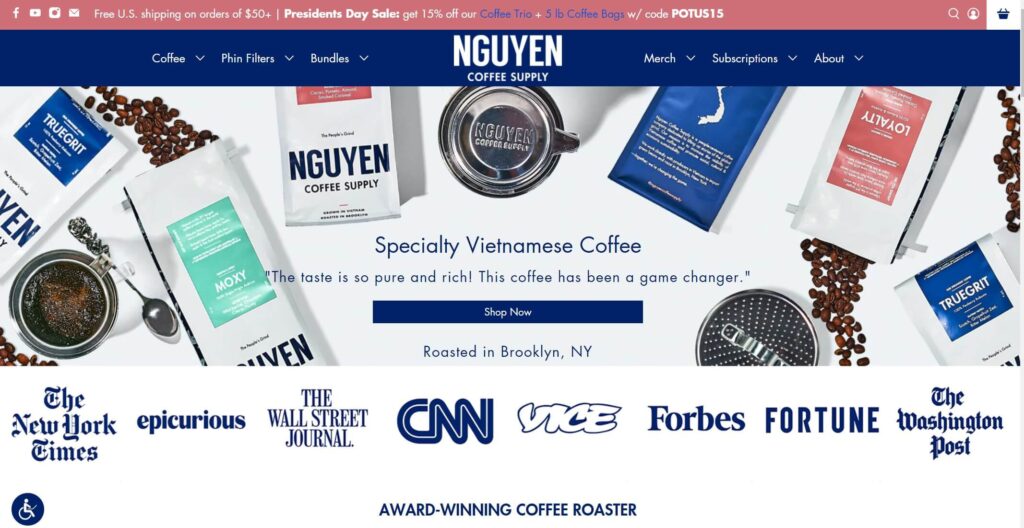
Nguyen Coffee Supply is the United States first specialty Vietnamese coffee company. Imported directly from Vietnam and roasted in Brooklyn, New York.
Sahra Nguyen, a first-generation Vietnamese American and refugee daughter, is on a mission to shape the future of specialty coffee by promoting diversity, inclusivity, and sustainability.
The first products celebrate both the Vietnamese specialty arabica bean, which accounts for less than 10% of the country’s coffee production, and the renowned robusta bean.

For those who like a sweeter, fruitier brew, the Moxy, which is made entirely of arabica, is your choice. The Loyalty mix brings together distinct qualities of Vietnam’s arabica and robusta for the right balance for consumers searching for a powerful and nutty brew with a smooth finish.

Vietnamese coffee is best brewed using a traditional vietnamese brew drip known as a Phin Filter, this helps to create the perfect hot or cold brew drip for you to enjoy!

3. Grumpy Mule
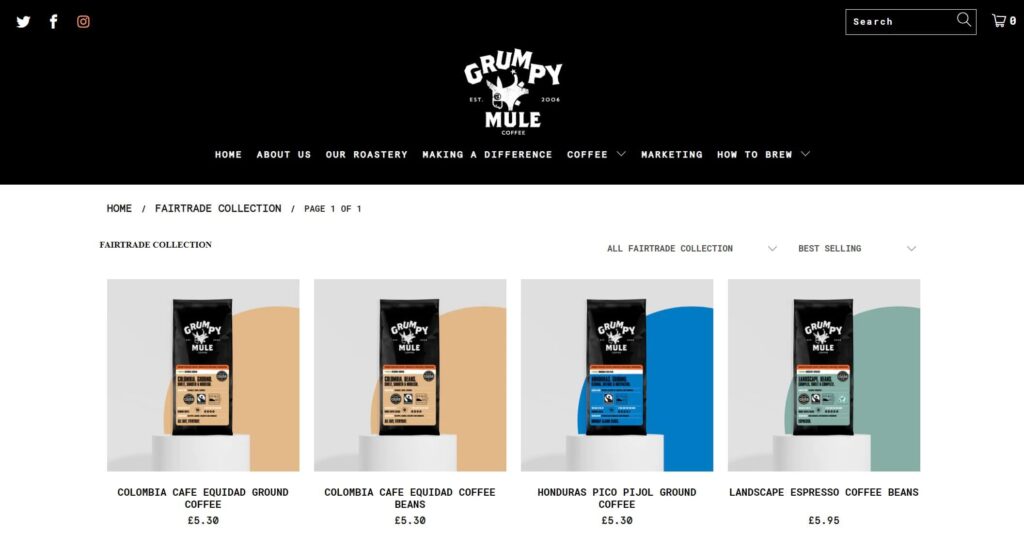
Since its inception in 2006, the objective of Grumpy Mule has been to combat the use of terrible coffee. Coffee that’s been thrown out, sourced unethically and that simply tastes bad has no place here.
As a result, the coffee beans are fairly and sustainably sourced. Roasted with precision and care, ensuring that every bean produced has the greatest flavor possible.

Organic Peru Ground Coffee – 227g (0.5lbs)

For those of you, who want all of the flavor but none of the caffeine this decaf alternative are for you!

4. Red Bay Coffee
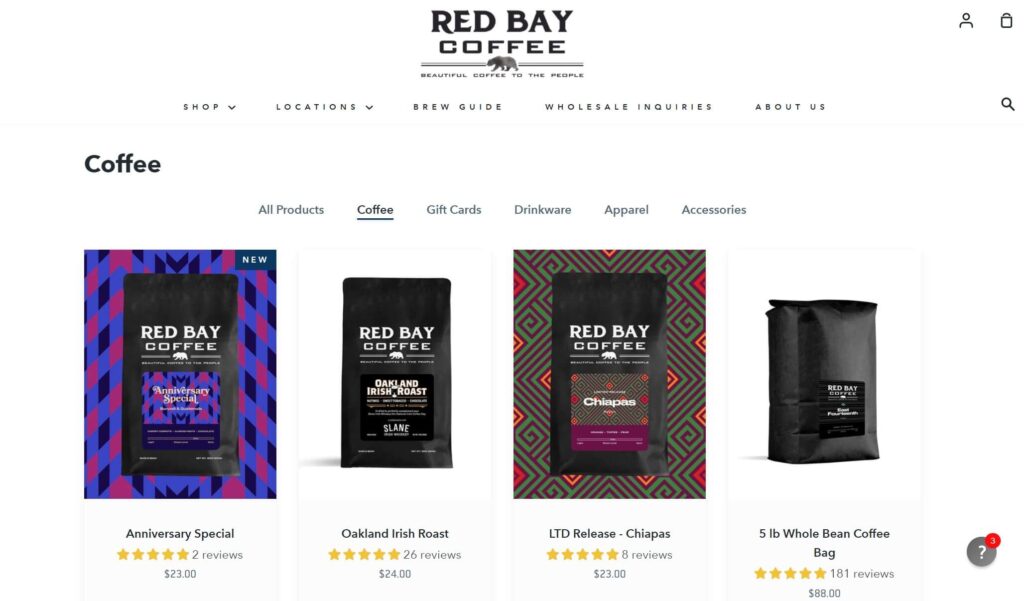
Keba Konte, an artist and culinary entrepreneur, created Red Bay Coffee in 2014. The organization is focused on ethical sourcing, socially responsible employment and management methods, and community-building in the San Francisco Bay Area.



Red Bay Coffee are dedicated to ensuring the coffee produced is both of the highest quality and sustainable.
In addition, they champion diversity, inclusion, social and economic restoration, entrepreneurship, and environmental sustainability.
5. Mt. Comfort Coffee
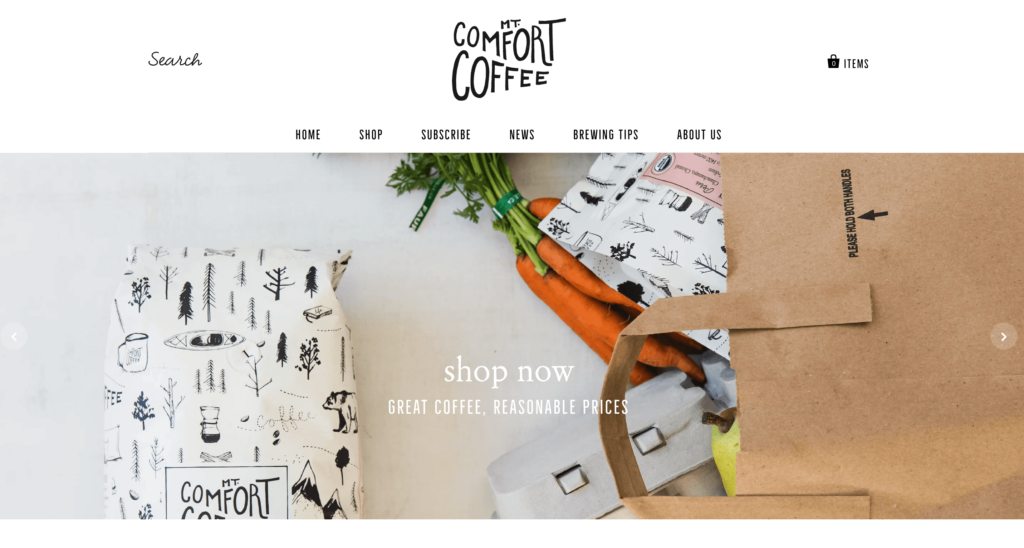
Starting from the idea of producing a single origin coffee with no blends, Mt Comfort Coffee was created. Whilst intending to be super fresh and super affordable to! They believe the key is to having farmers that understand the art of growing the perfect bean.


Also available are K Cups which are coffee pods for a single-brew using your home brewing system!

6. Peace Coffee
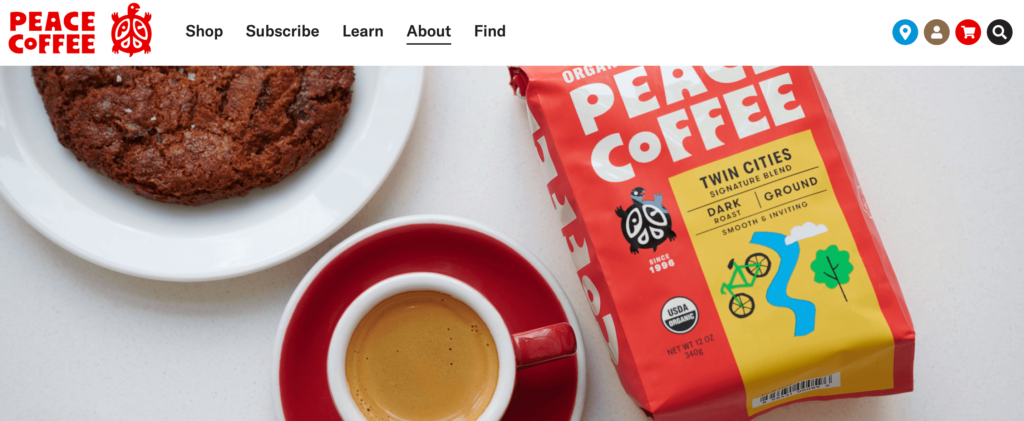
If you’re looking for a coffee with all the credentials, this is it! Organic Certified, Fair Trade, Shade Grown, Freshly Roasted and Certified B Corp, need we say more!
Peace Coffee make sure to source their coffee from small-scale grower cooperatives, resulting in smooth and rich flavors!
Coffees are organised according to type: Lights Roasts, Medium Roasts, Dark Roasts and Decaf! And they even have Ecopods available, made from renewable plant-based materials that are certified compostable.
They even have a coffee matchmaker quiz to pair you with the perfect coffee! Asking you discovery questions like, If you lived anywhere where would it be? Farm/City/Woods/Exotic. And what type of coffee mug do you drink from the most? Vintage/Travel/Camp/Modern.
We even tried it ourselves and were suggested the Colombia, French Roast and Tree Hugger beans! Can you guess our answers to some of the questions?



Rich, Bold flavor
7. Larry’s Coffee

Larry’s blends high-quality coffee with a philosophy that business can be a positive influence in the world.
All of Larry’s coffee is organic, fair trade, and grown in the shade. Even the fully recyclable k-cups (which is a big deal!) the company recently launched.
What is the importance of shade-grown coffee you may ask?
Shade-grown coffee works with the natural ecosystem, trees providing nutrients and natural predators helping to control the coffees natural pests. Shade-grown coffee also helps prevent soil erosion, improving soil quality.

Larry’s is a B-Corporation, demonstrating how business can be a force for good in the world.
Cooperative Coffees, was founded by the Larry’s. A collection of independent coffee roasters, importing coffee directly from farmers. With their objective of setting a better standard of collaboration and justice.
8. Doma Coffee
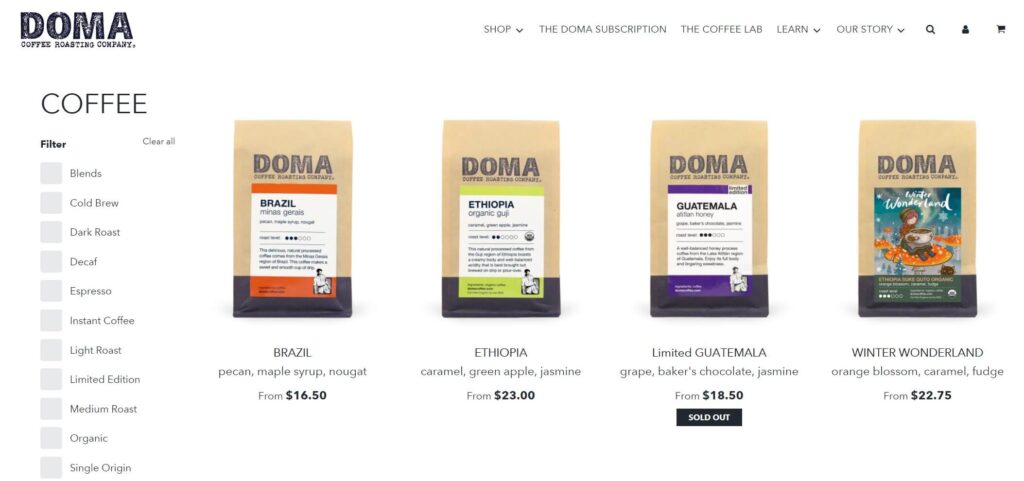

Carmela’s Espresso, 12 OZ

Organic The Chronic, 12 OZ
DOMA Coffee is certified organic by the state of Idaho and fairly traded through direct relationships. They are also a member of Cooperative Coffees.
Environmentally conscious, DOMA employs an eco-friendly roaster that saves 80% on natural gas compared to typical roasters. DOMA has created collaborations with various community groups and non-profits to give back as its impact has grown.
9. Tiny Footprint Coffee
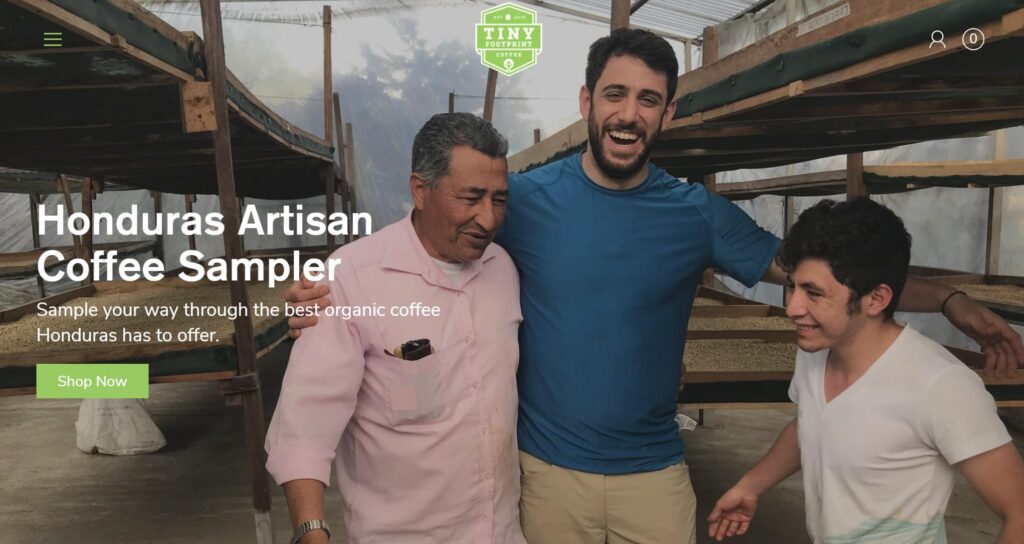
With the aim of reducing the emission of carbon dioxide, Tiny Footprint Coffee, the world’s first carbon-negative coffee, was established. To manufacture and deliver 1 pound of coffee, it requires 4 pounds of carbon dioxide to produce.

USDA Organic Coffee – Shade Grown,
Fair Trade Certified & Carbon Negative
So Tiny Footprint Coffee plants 54 pounds worth of carbon absorbing trees. This helps counter the 4 pounds of carbon created. Resulting instead in the absorption of 50 pounds of carbon for every 4 pounds of carbon produced!
A bit hard to wrap your head around, but I assure you it’s a great thing!

The company gives a percentage of the revenue from each pound sold to assist reforestation in Ecuador’s Mindo cloud forest. These trees will remove 54 pounds of carbon dioxide from the atmosphere over time.
10. Kicking Horse Coffee

Started 25 years ago in a garage in the middle of nowhere, Kicking Horse Coffee definitely came from humble beginnings. Since then they’ve grown and become a leader in the industry, and have even been called The Best Place to Work in Canada!
What’s the story behind the name you may ask? Well…
Legend has it, a Rocky Mountain (where Kicking Horse Coffee HQ is based!) explorer got kicked in the head by a horse, he was thought to be dead and his travel companions started to dig him a grave. But then a kick-ass cup of coffee was made and that woke him up! As the story goes…
Only 100% Organic coffee that is Certified Fairtrade is used, this ensures that the profits made empower farmers and are reinvested into the community.
Depending on what your preference is, they have a variety of beams as follows: Whole Beans, Ground, Decaf and Espresso.


Fairtrade, Kosher Coffee

11. The Organic Coffee Co.
A family run company striving to provide the perfect cup of coffee whilst helping to improve the life of every farmer they interact with along the way. This further helps to break the cycle of poverty existing in coffee communities.
The Organic Coffee Co. take pride in delivering the freshest, flavorful and sustainable organic coffee in the form of whole beans, ground and compostable pods.
The major benefit of Organic Coffee farms is they also combat climate change, due to emitting less carbon than chemical farms! This in turn helps to sequester significant amounts of carbon reducing their carbon footprint and the amout of carbon released into the environment. In addition to this, organic coffee beans are richer in healthful antioxidants, which some say they can even taste the difference!

USDA Organic

USDA Organic

Dark Roast, USDA Organic
12. Wandering Bear Coffee

Cafe-style, cold brew iced coffee on tap! Wandering Bear Coffee are USDA certified organic and Fair Trade USA certified. Their cold-brew coffee is available in a few flavours: Straight Black, Vanilla, Hazelnut, Caramel, Mocha, Decaf Black, Dirty Vanilla Chai, Peppermint Mocha, Pumpkin Spice and Almond Amaretto.



If you are a fan of cold brew like myself, Wandering Bear Coffee Company should be on your radar. They sell cold brew on tap in entirely recyclable boxes, as well as single-use fully recyclable cartons in 32oz or 11oz in a pack of 12. The coffee is twice as strong as a standard cup, yet it’s still smooth and tasty!
FAQs
What Is Environmentally Friendly Coffee?
While Brazil was once the greatest coffee bean grower in 2018, the United States made the most money from producing coffee the subsequent year.
The United States brought in over 82 billion dollars, while Brazil, coming in second, brought in 47 billion dollars.
Worldwide coffee output is expected to be 169.34 million bags in 2019, down 2.2% from the previous year. While global consumption is expected to climb 0.3% to 168.39 million bags.
With the ever-increasing demand for coffee, how does the production of coffee impact the environment?
First, we have to look at the process of coffee production. A coffee tree takes anywhere between 4 to 7 years to produce its first crop, and plants can bear fruit for up to 25 years. Then it’s harvested, either manually or mechanically.
The outer fruit, which holds the green coffee bean, is next removed and processed.
This is accomplished using one of two methods:
- Conventional sun-drying
- A mix of water and machines
The beans are then hulled, washed, sorted, and ready to be exported and delivered all over the world.
What is the environmental impact?
Coffee manufacturing, like any other sector, has an environmental impact. One 125 mL cup of coffee has a worldwide water footprint of 140 L, which is equivalent to more than 16-minute showers (ridiculously long shower session if you ask me), based on a study done by Water Footprint Network.
Scientific research by the Royal Botanic Garden revealed that 60% of wild coffee species are endangered, posing a threat to coffee production in the future.
Efficient crop management and properly regulated water practices, using pheromone boxes to keep insects at bay is one of the ways to ensure sustainable coffee practices.
Instead of pesticides, composting coffee bean waste to use as fertilizer, using coffee hulls as fuel instead of cutting down eucalyptus trees, shade-growing, and reforestation can all help to make coffee production more sustainable.
Take a look at coffee packaging bags if you’re aiming to consume caffeine in a sustainable manner. Here are some key points to look at when figuring out coffee labels.
1. USDA Organic
Everyone engaged in the product lifecycle, from seed to final packaging, must follow a demanding set of international requirements to earn this certification. Growers must adhere to set standards and techniques while using natural processes to cultivate and harvest coffee beans.
A product can be labeled organic if it was produced on soil that had not been treated with banned agents for three years prior to the harvesting process. The majority of synthetic fertilizers and insecticides are prohibited.
2. Rainforest Alliance Certified
When a coffee brand possesses the Rainforest Alliance certification logo, it indicates that the product was created by farmers, foresters, and businesses working together to create a world in which people and the environment coexist.
Coffee farmers, on the other hand, confront several obstacles, including increasing temperatures, plant diseases, climatic shocks, and volatile pricing.
The Rainforest Alliance helps coffee farmers improve their situation by linking them with responsible markets and giving training in climate-smart and regenerative growing techniques that increase yields and revenue.
The certification methodology also encourages innovations such as digital record-keeping, requiring coffee purchasers to invest in sustainable production, and a continuous improvement strategy that encourages growers to progress toward sustainability.
3. Shade Grown Coffee
Plants that are grown totally under the shadow of other trees are known as shade-grown coffee as the cherries mature more slowly than when exposed to direct sunshine, these coffee bushes create a better-tasting cup.
Coffee is exposed to more chemicals than any other human-consumed substance, except cigarettes. Coffee cultivated in the shade is almost always organic and chemical-free.
Chemically reliant coffee crops experience soil loss and increased erosion. Rainforests are razed to make room for new growth. The majority of shade coffee plantations are organic and environmentally friendly.
Here are the 5 best shade-grown eco friendly coffee brands for you to check out!
How Do You Make An Eco Friendly Cafe?
People are growing increasingly interested in sustainability. Ecofriendly is no longer just a hype word and consumers are becoming more conscious of it. Cafe owners and managers have a fantastic chance to introduce some sustainability into the hospitality business while also gaining a competitive advantage.
Besides using eco friendly coffee brands, let us look at a variety of improvements you may make to minimize the environmental footprint and support sustainability that is produced in cafes in 5 easy ways.
1. Limit Energy Consumption
The simplest and most straightforward measure is to eliminate inefficient lightbulbs and excessive air conditioning consumption.
Unlike other energy-efficiency appliances, replacing the cafe lighting with high-efficiency bulbs does not need any infrastructural or electrical modifications, the same power sockets are used, making it a simple process.
Here is a list of the 5 best energy-saving bulbs for you to look into.
Consider adding solar panels and water heaters, wind turbines, and other energy-saving devices if you are serious about lowering the consumption of energy of the cafe.
A simple practice is to ensure that the employees of the cafe turn off everything that does not need to be kept on overnight.
2. Go Digital
It should not come as a surprise that when you enter a cafe nowadays, you are required to scan a QR code to browse through their menu instead of flipping through the menu book.
Oftentimes, you can notice that a printed menu on each individual table at a cafe is becoming less popular. On the wall of a cafe, business owners are switching to large blackboards – for example, a standard brunch menu for everyone to browse through.
If your menu is available on your website, advertise it prominently throughout the store to encourage consumers to use their phones to explore the menu.
A fun way to encourage digitalization in a cafe is to come up with an app with a loyalty program. Allowing customers to earn points and rewards online rather than using paper membership cards is a simple step toward being more sustainable that will benefit both your business and customers.
3. Limit Wastage
The United States discards almost 40 million tonnes of food each year, more than any other country. This amounts to 30-40% of the total food supply in the United States and 219 pounds of trash per person.
That number looks insane, doesn’t it? Unfortunately, those are the statistics.
It should not come as a surprise that restaurants and cafes are one of the largest contributors to food wastage. One way to ensure that your business is practicing sustainability is to reduce the amount of food wasted.
All of the remnants of food, be it produces from the kitchen or the balance food from the plates of your customers, it may be given to local farms for composting. Employees and clients may take bags of your coffee grounds home with them to use as fertilizers in their garden.
If that does not get it going quickly enough, offer it to local farmers to use as fertilizer for their crops! A win-win situation if you ask me.
4. Dispose Of Chemical Products Efficiently
Replace all dangerous chemicals in your cafe with sustainable detergents and cleaning solutions.
Business owners miss out on the essential areas when discussing how to guide cafes toward eco-friendly alternatives which is the cleaning aspect of the premise.
Here is a list of the top 4 eco-friendly green restaurant cleaning products for you to check out.
5. Repurpose The Decor
An excellent opportunity to have some fun while also making a difference in sustainability is to extend the dedication to utilizing environmentally friendly items to all aspects of your business, including the furniture used in your cafe!
If your cafe is visited by environment enthusiasts, when they notice the effort put into making these small changes, you are bound to have a following of loyal customers, ensuring you a continuous stream of business.
Re-Worked, a UK-based company, produces furniture for businesses out of leftover coffee grounds gathered from offices around the UK.
How Do You Make Coffee More Sustainable?
I start my day with coffee, as do many others across the globe. However, how many of us have given thought to make our daily coffee routine more sustainable?
The millions of cups used by everyone have an impact on planet earth. Everything that happens before the coffee is put into our mugs has a large-scale environmental and social impact.
Let’s have a look at some ways to create a more sustainable coffee routine.
1. Use A Reusable Cup
Every year, 1.6 million trees are cut down to make 8,000 paper cups that are used by Starbucks each minute, totaling over four billion per year. All of those single-use cups are not truly recyclable because they are lined with plastic.
For us coffee lovers, drinking coffee is not something like getting a beverage, it is a ritual. Anything that tarnishes the routine should be eliminated, while anything that makes it easier and more fun should be welcomed.
This is where reusable cups come in.
Reusable coffee cups, unlike the cardboard, single-use used in coffee shops, keep your coffee warm for a long time. An eco friendly coffee mug is created from environmentally friendly materials.
Furthermore, utilizing eco friendly coffee cups and pairing them with eco friendly coffee brands reflects your sustainability ethics. You are not contributing to the wasteful cycle of producing paper or plastic cups.
Take a look at any one of these sites to purchase your reusable cup!
- 8 Best Travel Mugs
- 13 Best Reusable Coffee Cups That Aren’t Adding To The Landfill
- 18 Vogue Editors Share Their Favorite Reusable Coffee Cups And Travel Mugs
2. Use Eco Friendly Coffee Makers
When using an old-fashioned French press to manually brew your eco friendly coffee brands beans, you will realize that all you need is water, coffee grinds, and a heat source, and you have an eco friendly coffee machine in your home!
Manual brewing allows you to have complete control over the process. This will allow you to create the coffee to your liking and accentuate the various tastes of the ground coffee.
Here’s a great selection of coffee makers for you to try out.

- Bialetti – Traditional Moka Pot, Induction Friendly Moka Pot, Stainless Steel Induction Friendly Moka Pot

3. Use Reusable Coffee Capsules
Instead of the single-use coffee pods, here are some options for reusable and refillable pods to replace the plastic and aluminium versions:
- Stainless Steel Refillable Coffee Pods for Nespresso


- Reusable Coffee Filter Capsules for Keurig

4. Use a Pour-Over Coffee Cone
This works like your normal drip coffee but is a 1-mug portion. It’s the perfect way to have an cafe-standard coffee in the comfort of your own home.`




5. Get Composting
Coffee, in addition to being a fantastic beverage, is also a good fertilizer. Due to its high amounts of nitrogen, phosphate, potassium, and other trace minerals, all of which are essential to plant health.
The coffee grounds act as a fertilizer and have the advantage of adding organic material to the soil. This enhances drainage, and water retention.
They’re also good for your soil and one of the most simple food wastes to compost. You’ll also be able to add grinds to your bin or pile on a regular basis, if you’re a daily coffee consumer.

A simple way to start is by using a home composter for your coffee beans, not only do you get to make use of all your food waste but you will have the perfect fertiliser to feed your plants!
What Is Sustainable Coffee Packaging?
Plastic packaging is harmful to the environment if it is not properly manufactured and disposed of. Coffee packaging must be more than recyclable or reused to be genuinely considered as eco friendly coffee packaging, as it must be sustainable throughout its whole life cycle.
Here are some options for bags for coffee :
- Coffee Bags – Recyclable or Biodegradable
- Kraft Paper Packaging
- Rice Paper Packaging
Conclusion
These are our favorite 12 Eco-Friendly Coffee Brands for you to add to your cart and checkout!
Coffee processing factories frequently dump waste into rivers, causing pollution and contamination issues that can lead to eutrophication of water systems and the extinction of aquatic flora and animals.
Playing your part in being mindful about the way you consume your coffee, will help in increasing the sustainability of your daily routine. You might think that something as small as coffee consumption will not make any difference.
An average of 300 cups of espresso is being sold every day by a single espresso maker. That is just from one shop, so imagine the number of coffee being sold across the globe.
To learn more about growing coffee sustainably, below is a fantastic documentary to watch which teaches the basics of sustainably grown coffee. For example, the importance of knowing what shade grown coffee is and why it is important to choose it, as it means rainforests were not obliterated and cut down in order to grow the coffee! Exposed coffee bean crop will also require a lot more water as the exposed land dries out faster and the beans are grown under stressful conditions.
First and foremost, if everyone practices sustainability, sooner or later, the way coffee is consumed can be changed as there will be a demand for it.
Firstly, it is critical to demonstrate support for sustainable coffee businesses and to make ethical decisions that assist to make a difference. And secondly, you are actively making a difference by choosing to shop from sustainable coffee businesses, so whether you’re looking for eco friendly coffee brands or plastic free coffee makers, this article has got you covered!
12 Best Eco Friendly Coffee Brands You Need To Try!
Related posts
